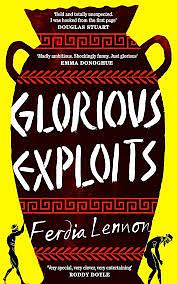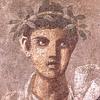Take a photo of a barcode or cover
adventurous
dark
funny
hopeful
informative
tense
fast-paced
Plot or Character Driven:
A mix
Strong character development:
Yes
Loveable characters:
Yes
Diverse cast of characters:
Yes
Flaws of characters a main focus:
Yes
Superb, original and gripping
adventurous
emotional
lighthearted
reflective
relaxing
medium-paced
Plot or Character Driven:
Character
Strong character development:
Complicated
Loveable characters:
Yes
Diverse cast of characters:
No
Flaws of characters a main focus:
Yes
emotional
funny
lighthearted
reflective
sad
fast-paced
Plot or Character Driven:
A mix
Strong character development:
Yes
Loveable characters:
Yes
Diverse cast of characters:
Yes
Flaws of characters a main focus:
Yes
adventurous
emotional
funny
medium-paced
Plot or Character Driven:
A mix
Strong character development:
Yes
Diverse cast of characters:
Yes
Flaws of characters a main focus:
Yes
Lennon’s debut (!) novel, <em>Glorious Exploits</em>, addresses a one-line throwaway from Thucydides suggesting that Athenian prisoners in Syracuse were pardoned for reciting lines of Euripides; he takes that concept and creates a whole world.
Disappointment is always hard to swallow, even in the face of reality. I can’t help but wonder about the parallel universe where I ended up doing a classics PhD, even though I know I am not at all cut out for academia (at least right now). I love Classics so much, and this book helped me reconnect with that feeling in a way I’ve not felt since my Latin/Greek courses. Ferdia Lennon has undeniably demonstrated that he is a masterful writer with a rich background in classics (not unlike Donna Tartt, incidentally), and I humbly bestow upon his book my personal award of ‘so great that I immediately purchased my own copy after reading’. In hardcover, no less. Scarcely a coincidence to have started this not long after <a href="https://www.goodreads.com/review/show/1133897827"><em>The Secret History</em></a>, huh… It is a rare book for me that can perfectly encapsulate the ancient world while enmeshing the reader in it, and Lennon does so effortlessly, all while writing in a distinct Irish vernacular that is witty and humorous. If you aren’t familiar with it, the dialogue may be jarring at first (especially in a historical fiction context), but I urge you to press on.
The novel features protagonist Lampo and his longtime best friend, Gelon. Both are unemployed potters with too much idle time on their hands; for fun, they decide to go ‘feed’ the Athenians and see what amusement they can derive in exchange (at least for Lampo; one can guess what Gelon’s motivations might be). At first, it just involves silly or dehumanizing tricks, but Gelon—a true tragedy aficionado—realizes that these Athenians represent perhaps the last vestige of Athenian drama that Sicily will ever get to see. Among the emaciated prisoners, the two friends gather a motley crew of ‘actors’ and begin planning a full-scale production of Euripides’s <em>Medea</em>, as well as one of his alleged latest, <em>Trojan Women</em>. A raggled cast of starving prisoners of war putting on the finest Greek tragedy in exchange for food and a chance at survival—yes, it’s a bit insane, but in the way reality often is. The characters feel realistically dynamic and, in particular, Lampo’s emotional growth led me to grow quite fond of him by the end of the novel.
The brilliance, of course, lies in the fact that Lennon depicts our characters in completely deadpan, ordinary style. These could be two unemployed blue-collar workers from anywhere, except they’ve been situated into an anecdote pulled out of Thucydides. Lennon doesn’t bother with verbose descriptions or overwrought dialogue—the prose is completely immersive and captivating through its cutting simplicity and matter-of-factness. The events easily sweep you along as you gradually grow invested in seeing Lampo and Gelon pull off this brazen venture, and by the time you get to the third act, I could barely take my attention away from watching the consequences unfold in all of their splendid glory. Lennon is clever too in that he weaves small moments and certain motifs throughout, hearkening back to them later in a way that is both surprising and sensible. The plot and characters work hand-in-hand as they progress, a surprising but skilled feat for a debut author.
Lennon also incorporates several themes to imbue the novel with greater depth. Among them, I greatly appreciated those of friendship (and what we owe to each other), memory (both collective and individual), mythopoesis/storytelling, the Other, and maybe even something like the ‘banality of goodness’, if that is a thing. The power of individuals and the ‘little guys’ to create lasting impacts, even beyond their means, even perhaps unintentionally. There is an undercurrent of fate/agency as well—I mean, of course there is, it’s Greek tragedy! The novel highlights the importance of how suffering and tragedy, even in their most miserable depths, can pave the path for the strongest joys, passionate aspirations, and meaningful hope for something better.
I’ve been fortunate enough to read Medea in the original Greek, once upon a time, and though I regret not having yet read Trojan Women, I was delighted at how the novel incorporates these tragedies and the psychological impact of creating art/telling stories into the narrative. The consequences of war is also a consistent undercurrent, and the plot never strays too far from its wretched effects. Since the novel is told in Lampo’s first-person POV, some might read the initial denigration of the starving Athenians as distasteful, but to me it served as a powerful contrast to later developments.
Ferdia Lennon: to you, I can only offer my sincere κῦδος and hope to see another novel from you soon. It doesn’t even have to be classically themed, but I will hardly be disappointed if it is.
Disappointment is always hard to swallow, even in the face of reality. I can’t help but wonder about the parallel universe where I ended up doing a classics PhD, even though I know I am not at all cut out for academia (at least right now). I love Classics so much, and this book helped me reconnect with that feeling in a way I’ve not felt since my Latin/Greek courses. Ferdia Lennon has undeniably demonstrated that he is a masterful writer with a rich background in classics (not unlike Donna Tartt, incidentally), and I humbly bestow upon his book my personal award of ‘so great that I immediately purchased my own copy after reading’. In hardcover, no less. Scarcely a coincidence to have started this not long after <a href="https://www.goodreads.com/review/show/1133897827"><em>The Secret History</em></a>, huh… It is a rare book for me that can perfectly encapsulate the ancient world while enmeshing the reader in it, and Lennon does so effortlessly, all while writing in a distinct Irish vernacular that is witty and humorous. If you aren’t familiar with it, the dialogue may be jarring at first (especially in a historical fiction context), but I urge you to press on.
The novel features protagonist Lampo and his longtime best friend, Gelon. Both are unemployed potters with too much idle time on their hands; for fun, they decide to go ‘feed’ the Athenians and see what amusement they can derive in exchange (at least for Lampo; one can guess what Gelon’s motivations might be). At first, it just involves silly or dehumanizing tricks, but Gelon—a true tragedy aficionado—realizes that these Athenians represent perhaps the last vestige of Athenian drama that Sicily will ever get to see. Among the emaciated prisoners, the two friends gather a motley crew of ‘actors’ and begin planning a full-scale production of Euripides’s <em>Medea</em>, as well as one of his alleged latest, <em>Trojan Women</em>. A raggled cast of starving prisoners of war putting on the finest Greek tragedy in exchange for food and a chance at survival—yes, it’s a bit insane, but in the way reality often is. The characters feel realistically dynamic and, in particular, Lampo’s emotional growth led me to grow quite fond of him by the end of the novel.
The brilliance, of course, lies in the fact that Lennon depicts our characters in completely deadpan, ordinary style. These could be two unemployed blue-collar workers from anywhere, except they’ve been situated into an anecdote pulled out of Thucydides. Lennon doesn’t bother with verbose descriptions or overwrought dialogue—the prose is completely immersive and captivating through its cutting simplicity and matter-of-factness. The events easily sweep you along as you gradually grow invested in seeing Lampo and Gelon pull off this brazen venture, and by the time you get to the third act, I could barely take my attention away from watching the consequences unfold in all of their splendid glory. Lennon is clever too in that he weaves small moments and certain motifs throughout, hearkening back to them later in a way that is both surprising and sensible. The plot and characters work hand-in-hand as they progress, a surprising but skilled feat for a debut author.
Lennon also incorporates several themes to imbue the novel with greater depth. Among them, I greatly appreciated those of friendship (and what we owe to each other), memory (both collective and individual), mythopoesis/storytelling, the Other, and maybe even something like the ‘banality of goodness’, if that is a thing. The power of individuals and the ‘little guys’ to create lasting impacts, even beyond their means, even perhaps unintentionally. There is an undercurrent of fate/agency as well—I mean, of course there is, it’s Greek tragedy! The novel highlights the importance of how suffering and tragedy, even in their most miserable depths, can pave the path for the strongest joys, passionate aspirations, and meaningful hope for something better.
I’ve been fortunate enough to read Medea in the original Greek, once upon a time, and though I regret not having yet read Trojan Women, I was delighted at how the novel incorporates these tragedies and the psychological impact of creating art/telling stories into the narrative. The consequences of war is also a consistent undercurrent, and the plot never strays too far from its wretched effects. Since the novel is told in Lampo’s first-person POV, some might read the initial denigration of the starving Athenians as distasteful, but to me it served as a powerful contrast to later developments.
Ferdia Lennon: to you, I can only offer my sincere κῦδος and hope to see another novel from you soon. It doesn’t even have to be classically themed, but I will hardly be disappointed if it is.
challenging
emotional
funny
reflective
medium-paced
Plot or Character Driven:
A mix
Strong character development:
Yes
Loveable characters:
Yes
Diverse cast of characters:
No
Flaws of characters a main focus:
Yes
adventurous
emotional
funny
inspiring
medium-paced
Plot or Character Driven:
Character
Strong character development:
Yes
Loveable characters:
Yes
Diverse cast of characters:
Complicated
Flaws of characters a main focus:
No
Glorious.
adventurous
dark
emotional
hopeful
lighthearted
medium-paced
Plot or Character Driven:
Plot
Strong character development:
Complicated
Loveable characters:
Complicated
Diverse cast of characters:
N/A
Flaws of characters a main focus:
Complicated
adventurous
dark
funny
medium-paced
Plot or Character Driven:
Character
Strong character development:
Complicated
Loveable characters:
Complicated
Diverse cast of characters:
No
Flaws of characters a main focus:
Yes




